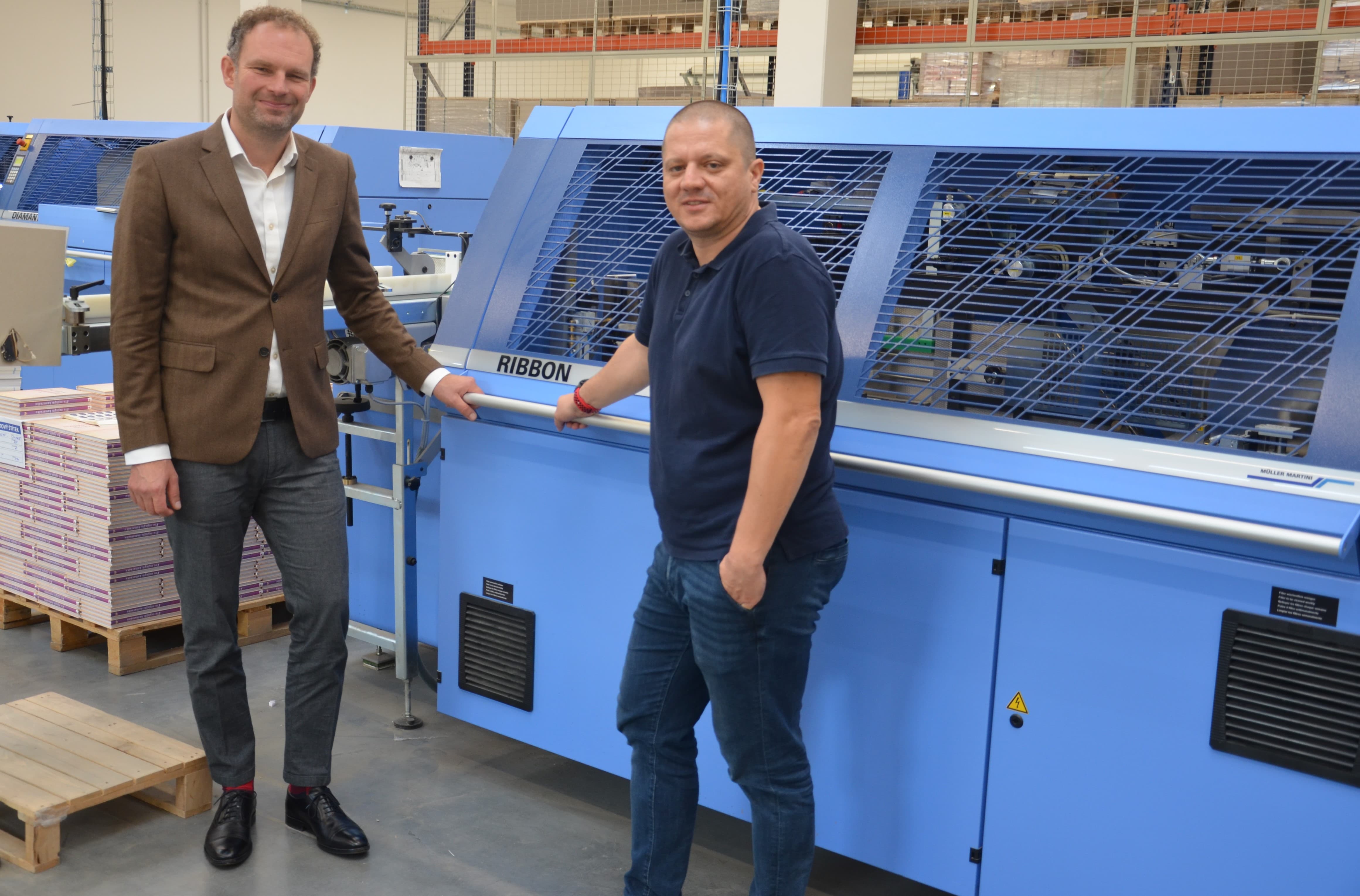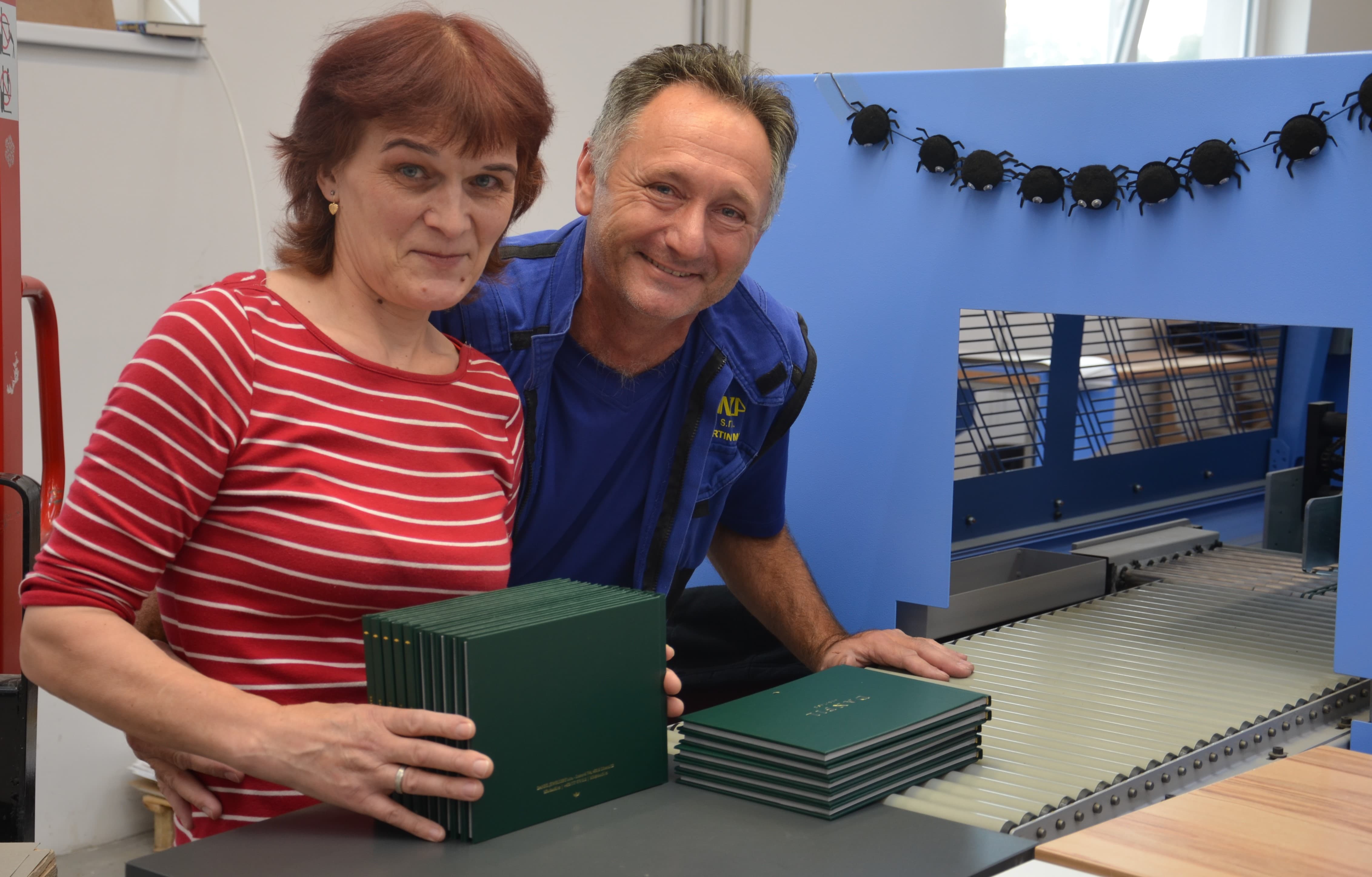Because the volume of hardcover orders increased significantly, TNM Print in Chlumec nad Cidlinou in the Czech Republic invested in a Ribbon inserting machine and a BLSD book stacker for its Diamant MC 35 bookline, which went into operation seven years ago. "Our productivity has increased significantly since then," says production director Radek Kuklík happily.
Hardcover products account for around 70 percent of the sales volume of TNM Print, which was founded in 1965 as a state printing plant to produce brochures for agricultural companies and privatized in 1996. After initially focusing on saddle stitching, it entered book production in 2014 with a Diamant MC 35 – the first Muller Martini machine in the company's history.
The lack of automation...
The decisive factor for this investment, which was followed a year later by a Ventura MC 200 book sewing machine, also from Muller Martini, was not least the company's entry into the Russian market. In particular, TNM Print, which is 70 percent active on the Czech market and exports 30 percent to several European countries, and whose circulation segment ranges from 200 to (in exceptional cases) 40,000 with an average of 2,000 copies per title, produces reprints of Russian textbooks. "These," says Radek Kuklík, "have flexo covers for weight reasons, which we can produce perfectly on the Diamant MC 35."
 Radek Kuklík (right), Production Director TNM Print: "We have been able to improve our position on the Czech market thanks to higher automation." On the left, Lubos Kunze, Managing Director of Muller Martini Czech Republic.
Radek Kuklík (right), Production Director TNM Print: "We have been able to improve our position on the Czech market thanks to higher automation." On the left, Lubos Kunze, Managing Director of Muller Martini Czech Republic.
In the wake of the Corona crisis, TNM Print experienced a strong upswing in the hardcover sector – especially in the segments of cookbooks (which are very popular in the Czech Republic), fiction, children's books and history books. The Diamant MC 35 easily absorbed the rising volumes. However, the lack of automation in two areas associated with manual labor increasingly inhibited the production flow: the insertion of ribbons and the stacking of finished books.
...remedied with two upgrade systems
To offset the resulting higher labor costs and speed up the workflow, TNM Print, which employs 50 people in three (printing) and two (finishing) shifts, therefore upgraded its bookline at the beginning of this year with a Ribbon inserting machine and a BLSD book stacker. According to Radek Kuklík, the intended effect of this bookline upgrade was quickly noticeable: "Our productivity has since increased significantly: in ribbon inserting – which is now done inline – by 40 percent, and in stacking by 10 percent."
Relieving staff of the stacking workload also had a legal advantage. This is because Czech labor law stipulates the maximum amount of weight an employee is allowed to lift per day.
 Věra Radu and Martin Mišik are pleased with the physical relief provided by the BLSD book stacker.
When the boss lends a hand
Věra Radu and Martin Mišik are pleased with the physical relief provided by the BLSD book stacker.
When the boss lends a hand
Despite the lockdown restrictions, both the installation and commissioning of the two systems went off without a hitch. "They meet our expectations 100 percent," emphasizes Radek Kuklík, "and we have been able to improve our position on the Czech market thanks to the higher level of automation – especially for books with ribbons."
Keyword pandemic: TNM Print, which prints with two Komori (one with five, the other with four printing units) and has won various prizes with its high-quality books, came through the Corona crisis relatively well – not least thanks to the flexible deployment of its staff. For example, the production director personally helped out on the gathering machine and on the bookline several times when there was a need. "This has made the team spirit in our company even stronger," sums up Radek Kuklík.